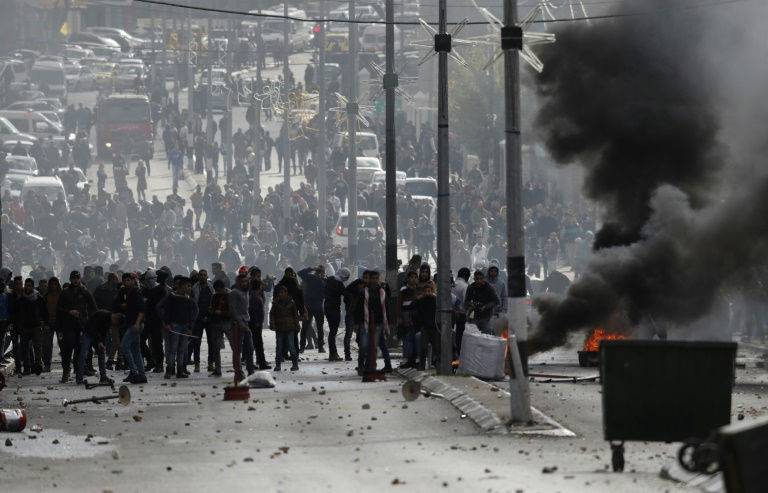After fall of ISIS, a new wave of instability hits middle east
Shares

US President Donald Trump’s recognition of Jerusalem as Israel’s capital sparked Palestinian protests, sporadic clashes and a call for a new intifada on Thursday as fears grew of fresh bloodshed in the region.
Trump’s announcement also prompted an almost universal diplomatic backlash, with fresh warnings from Turkey, the European Union and Russia.
Israeli Prime Minister Benjamin Netanyahu, however, lavished praise on Trump, saying his name would now be associated with Jerusalem’s long history and urging other countries to follow his lead.
Israel’s military deployed hundreds more troops to the occupied West Bank amid uncertainty over the fallout, while sporadic clashes between Palestinians and Israeli security forces erupted in various areas.
In a speech in Gaza City, Hamas leader Ismail Haniya called for a new intifada, or uprising, but unrest was limited for now.
At least two rockets were believed to have been fired from the Gaza Strip toward Israel, but Israel’s military said they landed inside the Palestinian enclave.
Further protests were expected after the main weekly Muslim prayers on Friday, with Hamas calling for a “day of rage”.
Protests on Thursday were held in West Bank cities including Ramallah, Hebron, Bethlehem and Nablus, as well as in the Gaza Strip.
Israeli forces dispersed several hundred protesters with tear gas at a checkpoint at the entrance to Ramallah, while the Palestinian Red Crescent reported 22 people wounded from live fire or rubber bullets in the West Bank.
Five Palestinians were wounded from Israeli fire in the Gaza Strip as dozens protested near the barrier sealing off the enclave from Israel, Gazan authorities said.
Trump’s defiant move — making good on a pledge from his 2016 presidential campaign — ends seven decades of US ambiguity on the status of the Holy City, claimed by both Israelis and Palestinians.
Trump said it marks the start of a “new approach” to solving the Israeli-Palestinian conflict.
“It is time to officially recognise Jerusalem as the capital of Israel,” he said in a speech from the White House on Wednesday.
US Secretary of State Rex Tillerson said Thursday during a visit to Vienna that Trump was “simply carrying out the will of the American people”.
– ‘Darker times’ –
But his willingness to part with international consensus on such a sensitive issue drew increasingly urgent warnings from around the world.
EU diplomatic chief Federica Mogherini said the decision could take the region “backwards to even darker times”.
Russia said it viewed the move with “serious concern” and Saudi Arabia called it “unjustified and irresponsible”.
Turkish President Recep Tayyip Erdogan said it would put the region in a “ring of fire”.
Palestinian leaders were outraged, with president Mahmud Abbas saying Trump had disqualified the United States from its traditional role as peace broker in the Middle East conflict.
Abbas visited Amman on Thursday to discuss the issue with Jordan’s King Abdullah II.
In a joint statement, the two leaders said “any measure tampering with the legal and historical status of Jerusalem is invalid” and warned that Trump’s decision “will have dangerous repercussions”.
Angry protests were staged in Amman and Tunis.
Palestinian shops in east Jerusalem, including the Old City, as well as in the West Bank were largely shuttered and schools closed on Thursday in answer to a general strike call.
“By this decision, America became a very small country, like any small country in the world, like Micronesia,” Salah Zuhikeh, 55, told AFP in Jerusalem’s Old City.
Trump’s move left many angry US allies struggling to find a diplomatic response.
Through gritted teeth, Britain described the move as “unhelpful” and France called it “regrettable”.
German Chancellor Angela Merkel said “we… disagree with the decision last evening”.
Eight countries including Britain, France and Italy pressed for an emergency meeting of the UN Security Council in response, which was set for Friday.
– Right-wing politics –
Trump also kicked off the process of moving the US embassy from Tel Aviv to Jerusalem.
In doing so, he begins to make good on a campaign promise dear to US evangelical Christian and right-wing Jewish voters — as well as donors.
Trump’s predecessors, from Bill Clinton to George Bush, had made the same promise, but quickly reneged upon taking office.
Israel seized Arab east Jerusalem in the Six-Day War of 1967 and later annexed it in a move never recognised by the international community.
The Palestinians want the eastern sector as the capital of their future state.
Several peace plans have unravelled in the past decades over the issue of how to divide sovereignty or oversee holy sites in Jerusalem.
The international community does not recognise the ancient city as Israel’s capital, insisting the issue can only be resolved in negotiations — a point reiterated by UN chief Antonio Guterres in the wake of Trump’s decision.
Guterres implicitly criticised Trump, stressing his opposition to “any unilateral measures that would jeopardise the prospect of peace”.
Trump insisted the move did not prejudge final talks, saying it simply reflected the reality that west Jerusalem is and will continue to be part of Israel under any settlement.
“The United States would support a two-state solution if agreed to by both sides,” Trump said, as he announced that Vice President Mike Pence would travel to the region in coming days. -AFP
